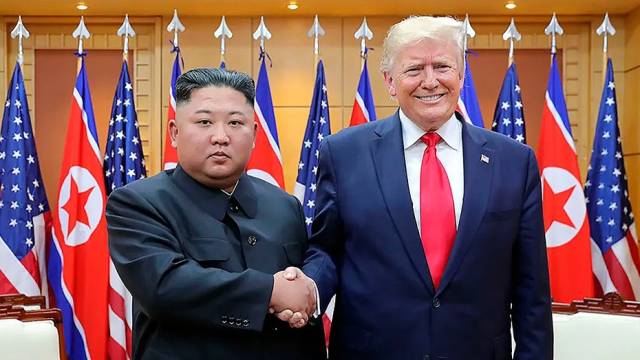As President Donald Trump considers a potential meeting with North Korean leader Kim Jong Un, questions arise in Washington and Seoul regarding the viability of a summit that once captured global attention.
For Trump, the key may not be in achieving new breakthroughs but rather in resurrecting a previous diplomatic strategy: the belief that personal diplomacy can succeed where traditional methods have faltered.
“I got along great with Kim Jong Un. I liked him, he liked me,” Trump remarked to reporters on Monday, highlighting his tendency to flatter adversaries, a tactic that often frustrates critics. “I’d love to meet him.”
Trump’s strategy regarding North Korea has been characterized by high-profile events — from the 2018 Singapore summit to the DMZ handshake and the failed Hanoi negotiations in 2019. While direct engagement briefly eased tensions and halted North Korea’s nuclear tests, Pyongyang has since significantly bolstered its nuclear capabilities, developing advanced solid-fuel missiles and strengthening ties with China and Russia.
Trump has suggested that sanctions relief could be offered in exchange for denuclearization efforts.
“Well, we have sanctions,” Trump noted regarding potential discussion topics. “That’s pretty big to start off with. I would say that’s about as big as you get.”
During a recent speech, Kim expressed he has a “good memory of Trump” but would only meet if the U.S. abandons its fixation on denuclearization.
Secretary of State Marco Rubio reaffirmed the U.S. stance on North Korea, emphasizing the goal of urging Pyongyang to relinquish its nuclear arsenal. “Our North Korea policy remains the same. It’s the denuclearization of North Korea. It’s an objective that we have all been pursuing for decades,” Rubio stated.
Adding to U.S. concerns is North Korea’s strengthening relationship with Russia. North Korea has reportedly contributed troops to Russia’s military efforts in Ukraine, raising alarms about what Pyongyang may be gaining in return, with U.S. officials warning of possible advanced satellite technology exchanges.
The emerging Moscow–Pyongyang alliance presents a “national security challenge that needs to be addressed one way or the other,” he added.
North Korea has yet to respond to Trump’s recent overtures. On Friday, the president acknowledged the challenges in communicating with Kim’s team.
“I think they are sort of a nuclear power,” he commented. “They have a lot of nuclear weapons but not a lot of telephone service.”
Kim seeks formal recognition of North Korea as a nuclear state.
In the absence of a clear framework to resolve ongoing tensions, any summit risks mirroring the Hanoi outcome: dramatic gestures with minimal results. However, some see potential for progress. Even a limited suspension of long-range missile tests or nuclear production could provide stability on the peninsula, with Trump remaining the only Western leader who has Kim’s attention.
 Telegram is where we really talk. Don't miss out!
Telegram is where we really talk. Don't miss out!








